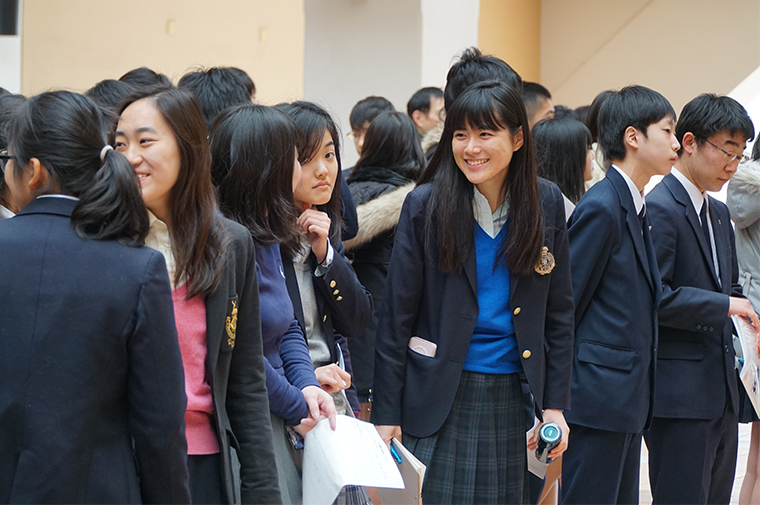The “Student Research Presentation Meeting of SGH and SSH” was held to conclude this year’s Tamagawa Gakuen SGH Project’s 2018 activities.
Tamagawa Gakuen has received a designation of “Super Global High School (SGH)” and “Super Science High School (SSH) * 1” from the Ministry of Education, Culture, Sports, Science and Technology. Approximately 200 students are working on SGH or SSH programs and they jointly reported their research results for the year.

The presentation was composed of two parts; the first half was for three teams who conducted a research presentation in each of four classrooms. In the second half, 147 students from the 10th grade to the 12th grade, presented their posters.
About 50 visitors from junior high schools, high schools, universities and independent administrative corporations visited from across the country.

“I would like everyone to acquire an attitude to learn beyond the field of liberal arts and science and to develop the ability to explore questions that currently have no answers.”
At the opening ceremony, Professor Hasebe, Tamagawa Gakuen High School Education Director, conveyed the purpose of the meeting and the presentation began.

The three teams who worked on SGH made a presentation on their research topics, “Round Square International Conference 2018”, “The Relationship between Saudi Arabia and Iran from the View of Oil Prices” and “Current Status and Nature of Model United Nations in Japan”.
The students of the three teams presented their experiences during local visits, the outcomes and improvements of their own activities, considerations and suggestions on research content, and presented them.

“We implemented five measures to acknowledge the original purpose of holding the Model United Nations.”
“I realized that it’s important not only to transmit my own values unilaterally but also to accept other’s values.”
The words of the students who spoke about what they experienced themselves and the trial and error process they went through, was very persuasive. Many students were listening sympathetically.


“What do you think should be done in order to enhance the quality of the Model UN as it expands in the future?”
“While participating in round square, did you feel like your postures have changed?”
The students who were listening to the presentations asked questions concerning the research themes and contributed to the overall inquisitive atmosphere.

In the poster session in the second half, the students divided themselves into 11 classrooms and made presentations.
The presentation times were broken into three slots so that students could see each other’s presentations.

The 69 students working on the Tamagawa SGH program were divided into groups “African Studies”, “European Studies”, “Model United Nations” and “Round Square”.
They presented with themes like as “Is Japan’s ODA going to solve poverty in Africa?”, “What is fairness in conflict areas?”, “The Origin of Jewish persecution”, “Peace building after the war in Iraq” and so on. The students spoke about the things they studied, made suggestions for improvement, and gave their impressions on what they had done.

“I visited an settlement area in South Africa and talked to the local people, I learned that various elements of life such as education and labor are intricately intertwined and I felt the depth of the problem facing many people. In the future I would like to participate in the Japan Overseas Cooperation Volunteers to solve these problems.”
“When I looked into human rights issues, I was surprised by the high level of awareness of problems overseas and the number of actions being taken .In contrast to that, I felt that awareness was low in Japan and I would like to raise awareness.”
Students developed firm thoughts about their research as well as making it appeal tothe visitors.
The attitudes and preparedness of each student were conveyed to the listeners.

“There are areas where improvement of human rights problems is difficult because of religious and cultural issues, but how do you think it should be overcome?”
“Poverty is a distant problem for us, but what do you think we can do?”
The visitors not only listened, but also offered substantial questions.

“I believe that we should eliminate negative ways people are treated regardless of culture or religion.”
“I think that it is important to have the recognition that ‘we have prejudice’. Moreover, I would like to think about what I can do for myself.”
The presenters immediately responded to the questions with frank opinions.
Exchanges like these were done everywhere and it was clear everyone in the venue was very enthusiastic.

“In society, we need the power to find and solve problems, both SGH and SSH are efforts to acquire independence through exploration. Take advantage of what you have noticed, and continue to develop the ability to think and resolve issues by yourselves. “
In the closing ceremony, Mr. Miyazaki of the Japan Science & Technology Agency which supports SSH gave encouraging words to the students.

At the report meeting for teachers, held after the Student Research Presentation Meeting, it was reported that the Tamagawa SGH project’s efforts for 5 years led to significant results.
“The follow-up survey of graduates revealed that the proportion of those who wish to pursue work in international relations increased, not only for current students but also for students who had gone on to university.”


The students got further input and feedback from many people who have a wide variety of viewpoints developed over the year. These were things that they had thought about and experienced themselves. Their expressions were filled with a sense of accomplishment that can motivate them to continue working toward the future.



